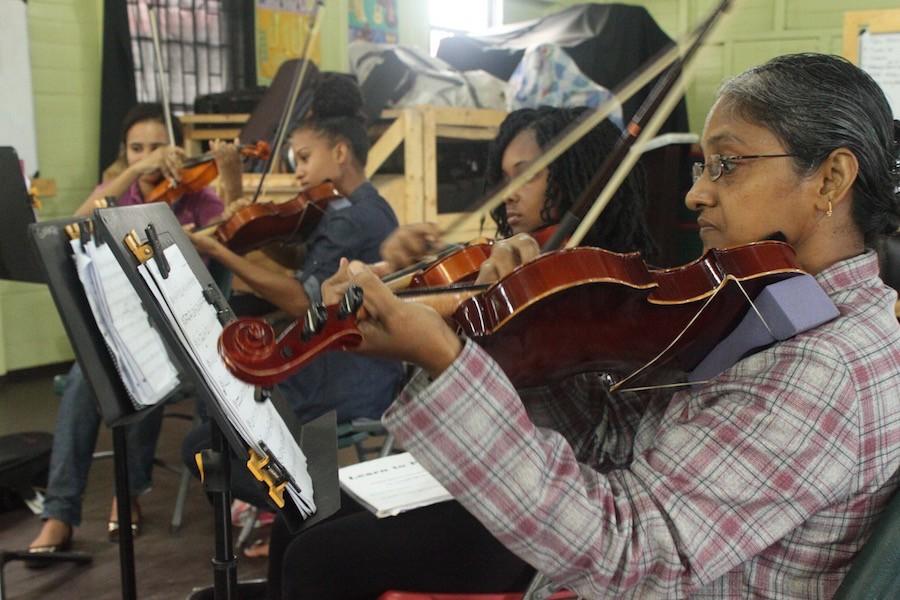Band director opens music school in Guyana, South America
Eric Sayre is known to many students as the band director here at South. But many are unaware that between conducting, lesson planning, and concert preparation, Sayre has an additional full time job- in another country.
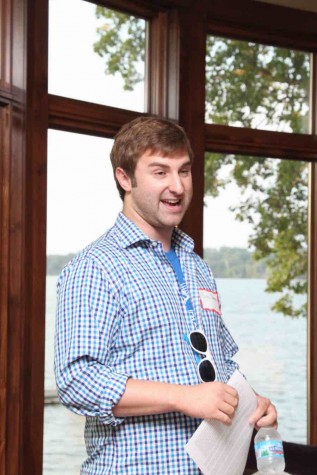
Sayre is the director and founder of the Guyana Lutheran Music Academy in New Amsterdam, Guyana, which opened in 2014. Shortly after graduating from St. Olaf College, Sayre and a fellow graduate taught instrumental music in Guyana for five months.
“It seemed really silly to ever stop doing that,” Sayre commented. “I really felt the need to come up with something more sustainable and more long-term. Music education, any kind of education, doesn’t happen in a matter of 5 months.”
Why did Sayre take the time and effort to build a music school 3,500 miles away? “I truly believe that music is a life-changing experience for anyone who wants it,” he said.
Culture of Music in Guyana
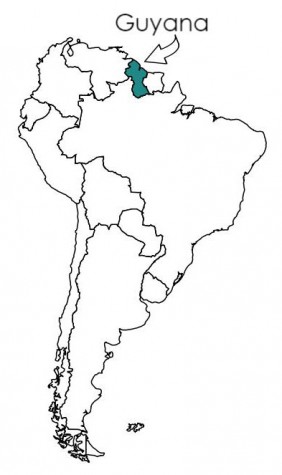
Guyana is located South America, bordering Venezuela, Suriname, and Brazil. New Amsterdam is on the northern coast of Guyana.
GLMA is located in New Amsterdam, the third largest town in Guyana with a population of over 30,000 people. Guyanese music has native, Indian, African, and European influences and calypso is a popular genre, according to the website Guyanese Pride. However, most students are not exposed to music education or learning instruments in schools.
“There are zero music teachers except for us in [New Amsterdam]. There’s about 12 music teachers in the country, is a good estimate,” Sayre said. “Because music is something [the students] don’t have, it is incredible how much they ask for it and want it.”
“In Guyana, mostly we have steel pans and brass instruments mostly government bands,” Elizabeth Paduman, an administrator and keyboard student at GLMA who works full time for the Evangelical Lutheran Church in Guyana, stated. “People here are very excited to see students playing the Violin which is not a culture here in Guyana,” she continued.
When Sayre gigs with musicians in Guyana, he is often challenged to play without written music. “If you are a professional musician, you mostly play by ear,” Sayre described. “If you’re accompanying a singer, they start to sing and then you follow them … A Guyanese musician who’s really talented … can create chordal structure and progressions from never hearing the song before.”
Students: Motivated and Multigenerational
Currently, 120 students who range in age from 11-years-old to 73-years-old study an instrument at GLMA. Students are able to register for classes in keyboard, guitar, voice, brass, percussion, or violin, keyboard being the most popular.
“Those are instruments that were chosen by the community to want to learn,” Sayre expressed. “We really, as an organization, think it’s important when we’re doing international outreach that we do more listening than prescribing; we do more asking than telling.”
The Academy’s name derives from the Evangelical Lutheran Church in Guyana, who donated the school’s building and provided teacher housing. Despite the title, the school is open to students of all religions.
“I wanted to help GLMA so that we can grow and build this school, because music is what we need in most of our Lutheran Churches and in the community of New Amsterdam,” Paduman expressed. “As a student, I decided to join GLMA because here in Guyana we do not have music in schools, so I was never exposed to music before … So far I am enjoying every bit of it. It just takes me away from work and home and put me in a good mood.”
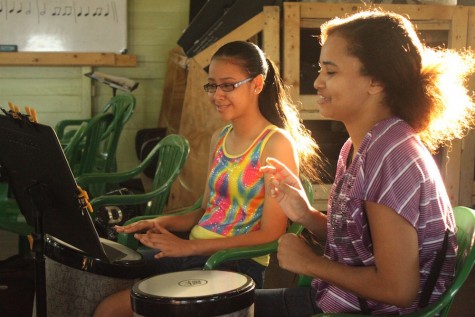
In a video posted on GLMA’s YouTube channel, 49-year-old keyboard student Zaman Nabijan described feeling a sense of accomplishment during his classes at the Academy. “It makes me very happy,” he stated. “I forget about my business and everything else. I’m just free.”
Nabijan also mentioned one benefit of having multiple ages in each classroom. “Now that I have a 14 year old daughter and our age gap is this wide, being in piano class with her kind of bridge that gap because here we’re doing something together,” he said.
“The students are always willing and anxious to learn something new,” Paduman added. “They are also very helpful in moving instruments and setting up the academy for concerts and other events.”
“[Students] do pay tuition to help keep people committed to the school,” Sayre explained. The tuition amount was decided by the local board of directors from the Lutheran Church, “to be affordable and reasonable to most income levels,” Sayre said.
“We’re not there to make money,” Sayre repeated, laughing. About 20% of students are on scholarships.
“One of our biggest challenges at GLMA is having lots of applicant and not being able to accommodate all of them,” Paduman said. There are students on waiting lists for every instrument.
Teachers: Aspiring Music Educators
“The Teachers at GLMA are awesome, they are very patient and helpful with their students,” Paduman described. “For example if a student was ill and could not attend class they will call and ask student if they can come in at some time to work with them so they can catch up for the next class,” she continued.
![Twyla Sommersell, guitar and voice teacher, leads a class. Three teachers with degrees in music education are hired each year. So far, all of the teachers have come from the United States and many have just graduated college. “[The teachers] teach as artistic collaborators,” Sayre emphasized. (Photo courtesy of Eric Sayre)](https://www.shsoutherner.net/wp-content/uploads/2016/01/glmatwyla-317x475.jpg)
So far, all of the teachers at GLMA have come from the United States. Three teachers are hired by the organization every year, many of them proficient in more than one instrument.
“[The teachers are] just fresh out of college for the most part,” Sayre stated, mentioning the traveling aspect and modest pay of the job. “The people that say ‘yes’ to that usually are around 21, 23,” he explained.
Although the teachers are young, they’re held up to a high standard- the school only hires teachers who have a degree and license in music education. “When you’re already trying to figure out how to live in another country, it can be scary to also try to figure out a new profession,” Sayre said. “You have to be a resilient person to live abroad.”
Many times the students are older than the teachers, which caused nervousness among the teachers at first, “especially being foreigners,” Sayre said. “It turns out that no matter who you are, you can figure out a role of teacher to student, or musician to aspiring musician … [The teachers] teach as artistic collaborators,” Sayre stressed.
Global Connections: Minneapolis to New Amsterdam
“We believe that the school not only enriches the lives of our students but enriches the lives of our volunteer teachers,” Sayre said. “Through getting to be a meaningful visitor to that country, not just a tourist, not just a 2 week stay, that we can begin to bridge that global gap … of not understanding what it means to live in other countries. Me going there four times a year wildly changes my life and changes our teachers’ lives.”
Right now, a nonprofit in Minneapolis of the same name financially supports GLMA. The teachers, instruments, supplies, and the maintenance all come from the United States, including from the Minneapolis Public Schools District and South families. Sayre is constantly trying to bridge the gap between the 600+ donors in the United States and the school. “How do we connect and motivate people up here to care about something so far away?” he asked.
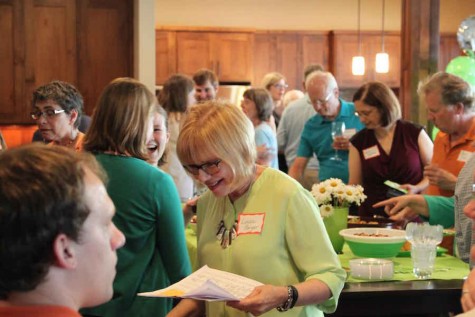
“The big thing is that connection,” Sayre continued. “If we’re gonna continue to support and say that we’re a partner up here in Minneapolis, how are we really partnering instead of just like, handing resources and saying great, good luck! To me, in a partnership, that means both sides need each other … There are things [the Guyanese community] can provide that we need, such as friendship and family in another country. We don’t know that that’s a need of ours. Minnesotans don’t know that that’s a need of theirs, and I didn’t know that that was a need of mine until I started doing this.”
Ultimately, Sayre’s goal is for the school to be completely Guyanese-run, in terms of teachers, administration, and support from the local community. “[That would mean] instrument repair shops, music supply stores, a music education major at the one and only college in the country,” Sayre said.
“I’m not necessarily looking to mass produce an international music school. I’m looking to deepen a relationship with one community … This isn’t about the heroism of bringing music to a developing country,” Sayre continued.
High School Connection
Sayre is currently developing a program to bring South students to New Amsterdam over the summer. Before the trip, students registered as a small musical ensemble would attend a semester-long after school program to learn about Guyanese culture and history, music education, and volunteering abroad. Then, the high schoolers would lead a 2-week summer camp at GLMA while the full time teachers would be on vacation.
“If we can get an international volunteer experience that’s shorter for a high schooler to go on that doesn’t involve debt and doesn’t involve the stress of not working a paying job, that could be cool,” Sayre explained the idea behind the high school connection. “Hopefully [students] might go on in [their] future career to be more aware of the world and what it means to not just be a Minnesotan-American.”
Finding Value in Music and Creativity
“Personally, it’s been a challenge for me to do two jobs at once. My heart is very split between South and GLMA and I go home to work on GLMA on a nightly basis,” Sayre confessed.
Although Sayre has a heavy workload, he deeply believes in the importance of music in both communities.
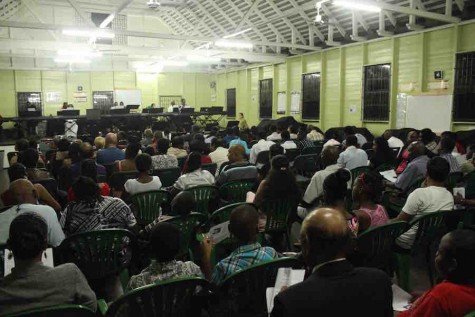
“[GLMA] does what I thought it would do on a surface level, which is on a daily basis remind me of how awesome South is and how awesome what our program is here … The culture that’s built in Americans to value arts and to value creativity is something that is not as prevalent in Guyana. When I come back, that seems like a normal thing here, but it’s very special for me on a regular basis,” Sayre explained.
Sayre emphasized the importance of the quality of the musical experience over the quality of the music itself. “[GLMA] made me realize that music doesn’t have to be at a quality level to be life-changing,” Sayre said. “For me to feel an emotional investment in playing Hot Cross Buns … Not the beauty of the music, but the beauty of the people making that music is what I experienced. Now I see that almost every day here at South and every time I go down there. I love what we’re doing.”
Sayre also has a message for high schoolers who have a desire for a project, even as big as GLMA. “The idea that, if you work hard, and if you make the right connections and if you ask enough people to help you, that you can achieve something that is pretty cool,” Sayre concluded.
Additional information about the Guyana Lutheran Music Academy can be found at glma.gy.
